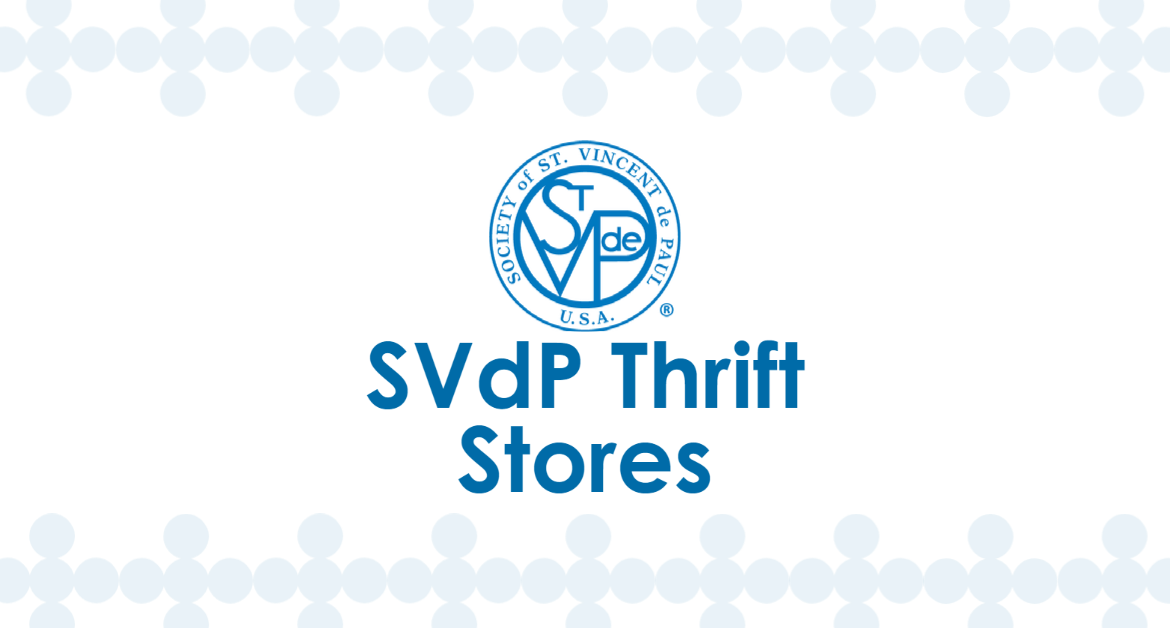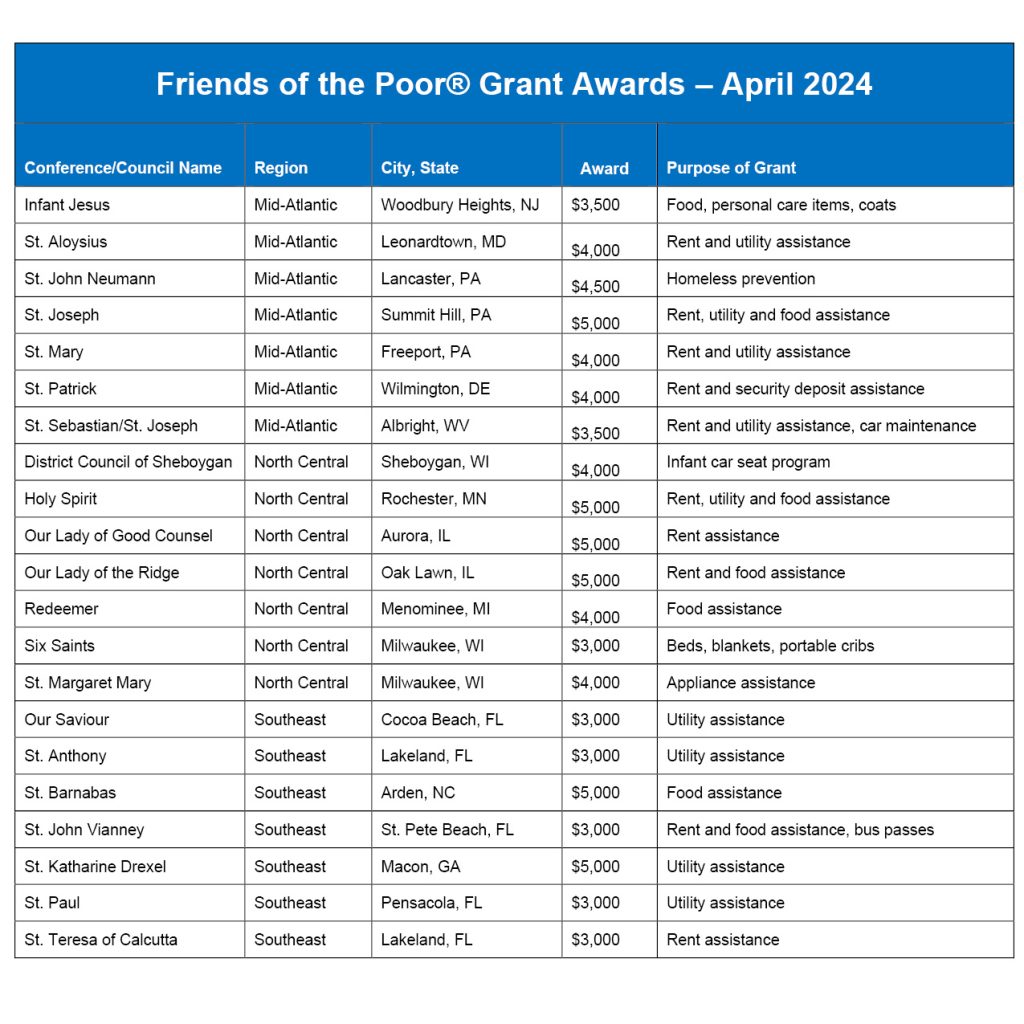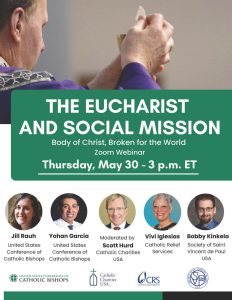By Mike Syslo, former Chair of the National Governance Committee
There are a set of basic ground rules that should be kept in mind before visiting with those who have requested our help. It is a good idea to review them on occasion, understand them and put them into practice.
- If you are on a witch hunt, stay home.
One of our purposes as members of the Society is to bring the love of God to those who are in need. You cannot do this if your personal expectation is that the people you visit are on the take, that they are out to get us for whatever they can. If you believe that the people you are going to visit are going to give you a phony story, if you believe before you actually meet with them that they “are only going to sell the food to get money for cigarettes or alcohol or drugs,” then you have prejudged them and shouldn’t be participating in the interview. Our role as helper obliges us to keep as open a mind as possible. Give those we serve the benefit of the doubt – at least until you have heard their story and can make a reasonable judgment as to the validity of the need. Remember, it is the need we are judging – not the people. So, the first ground rule calls for you to judge yourself – not the circumstances, not others. What is your reason for going on this visit? If you are on a witch hunt, you have no Vincentian reason for being there. Stay home.
- If you are an expert on life, stay home.
Have you ever heard the comment: I’ve lived a long, difficult life and I’ve never had to ask for help.? (Better yet, have you said such?) Some people (Vincentians) have a tendency to feel that they know the answers, they’ve heard it all before, they know the circumstances, they know what questions will be asked, and they know what they are going to do to resolve the request before the visit occurs. The problem with being an expert is that experts have the answers before the questions are asked. The problem with experts is that they are ready with what needs to be done while the words of the request are still being formed in the mind of the one asking. The problem with experts is that they don’t listen. And, that is exactly what is expected of Vincentians: Vincentians must be good listeners. Vincentians should go on a call with no preset plans in mind. Vincentians should visit those in need with the spirit of a servant asking their masters “what is it that we can do for you?” Our Lord has called out to us. It is He whom we are serving in the person of the poor. We must go to Him humbly asking what it is He seeks. But He does expect us to say “yes” when appropriate and “no” also when appropriate. Be a good listener. If you are an expert on life, stay home.
- If you cannot smile and be pleasant, stay home.
Let’s face it, everyone has a bad day once in a while. It happens to the worst of us. It happens to the best of us. However, as Vincentians we represent Christ to those we serve. We must be pleasant, loving and caring when we encounter those in need. Our Lord asked us to love one another as He has loved us. That’s a tall order and we need to represent Him well. What this means is that if you are having a bad day, you can’t show it. And, if you can’t not show it, stay home. You are doing no one any good – including yourself.
If your normal personality matches the movie title “Grumpy Old Men,” then you shouldn’t be going on home visits. Grumpy people never provide those they encounter with feelings of love and renewed hope. That’s part of what we are doing when we go to those in need. We are showing them that God cares. He cares so much that He sent us to try to help. So, if you are a grumpy old man or woman, stay home.
Burnout often reflects itself in rude, crude and downright ugly behavior. Unfortunately, we never recognize it in ourselves. It’s always someone else who sees it. And it is worse if the one who sees it is the one you are supposed to be helping. If you see this in your partner, make sure he/she stays home.
- We are responsible for our effort, not for success.
It would be great to point to every home visit that we make and be able to say, “This is one of our finest success stories. We did such and such and it really turned things around for this family. They’re doing great now.” Well, in doing a reality check, we know better. We know, in fact, that very few of the families we visit for the first time ever even take the good advice we give them. That’s part of human nature and we should not expect much more. So then, what is our role if it is not to change people’s lives and get them on the road to heaven? Our role in serving those in need is twofold. First, it is to show those who are in need that God cares about them; He cares so much that He sent us to do what we can to help. Second, our role is to make life a little bit better for them right now, this moment, to give them some hope. If we can do more, that’s great. If not, that’s okay too.
We are responsible for making the effort to help. We are responsible for our attitudes, for the amount of love we put into the visit, for the amount of love we put into the advice we give. We are not responsible for making it all work. We can give advice but we cannot force those we are trying to help to take the advice and run with it. We cannot place conditions on the help we give; so we should never refuse to help because they didn’t follow our last advice. Christ asked us to love one another as He loved us. His love was unconditional. Focus on what you can control and that is your effort. You may walk away from a visit feeling like you have made a real difference or you may feel like you were not able to change anything. The impact of what you do today may not show up for months or years. If you are going to make an evaluation of the visit, then evaluate yourself, your effort, the impact of the visit on you, and not whether anything is different for the family you visited.
- Judgment – not judgmental!
Everyday we are faced with making decisions and everyday we make a choice on each one of those decision points presented to us. Some of those choices are good, some are bad and some are inconsequential. We hope for the most part that our decisions are good ones. When we are faced with what our Lord presents to us on our visit to Him (in someone’s home), we are asked again to make a decision, a choice, a judgment.
We are asked to judge the validity of the need and the level of resources that are available to us. We are asked to listen to what is presented, observe the surroundings, analyze the circumstances, and evaluate what we have to work with. It is the need that is important. Is this real? Do they really need the groceries? Do they really need the rent help or is the rent not even due for another two weeks? Do we have enough money to pay the portion of the bill that they cannot cover? We are asked to make a judgment – period.
Don’t make your decision based on any one of the many varied lifestyle choices that people make: are they living together instead of being married; is it a mixed marriage; are they just going to take our help and use their own money to buy cigarettes, beer or drugs; is the house filthy and the kids as well; does the whole place smell of stale cigarette smoke or urine; is the old man just lounging on the sofa? These and a thousand other questions are based on lifestyle choices and cause us to be judgmental.
We are asked to make good judgments about whether to help or not. We are not to be judgmental about lifestyle choices. It’s not easy. We have to deal with mind and heart issues as well as all our life experiences. Our Lord told us to love one another as He loves us. Don’t deny someone your help because you disagree with how they choose to live. Make the judgment – don‘t be judgmental.
- Who owns the groceries? Let go!
Letting go is something that has been promoted as a necessary part of maintaining both a good mental and emotional balance. Essentially the saying is “let go, let God!” Within our Vincentian way of life we are asked to do the same thing but from a slightly different aspect.
Often our members place a tremendously high value on the material things that we give to those in need. Often we are judgmental about the people we serve based on how they deal with the things we give them. Jesus told us to love one another as He loves us. And He loves us unconditionally. He doesn’t attach any strings to the gifts He gives us. He doesn’t ask us to dance to a particular tune in order to receive the gifts He gives out of love. And He certainly is not going to withhold any future gifts because we didn’t care very well for what He gave us in the past.
The same should be applied as Vincentians give their gifts to those in need. There are no strings attached. Our gifts are unconditional. When we give a person or family a box of groceries, who owns the groceries? They do. When we give a person or family some clothing or some furniture, who owns the merchandise? They do. They have ownership. How they handle it, how they dispose of it is their business.
We are asked to make a judgment about the need that is presented to us. We are not asked to be judgmental about the actions of the people we are about to help. Let go. Judge each case on its own merit. “The measure with which you measure will be used to measure you.” (Matthew 7:2)
- Work within the guidelines of the Conference.
It has been stated in many ways in many St. Vincent de Paul publications: the basic unit of the Society, the most important unit of the Society is the Conference. It is the Conference that has the resources. It is the Conference that does the works of charity. It is the Conference that decides what will and what will not be done. In the United States, all Conferences are run democratically. All decisions are made by the group. No individual member has a right to override what the Conference decides. Every Conference establishes a set of guidelines upon which the members may operate as Vincentians. Assuming that the guidelines do not contradict the Rule of the Society, it should be understood by all members of the Conference that the guidelines must be followed.
For example, a Conference guideline may allow for any visiting team to spend up to $150 based on their own evaluation of the need and circumstances. If more than $150 is needed, then it must be brought back to the Conference for a decision. It would be improper for any visiting team to simply approve payment of or pay a bill for $220.
If the Conference as a group decides not to give any further assistance to a specific family (regardless of reason), it would be wrong for an individual member or visiting team to assist the family in spite of the Conference decision. All members must work within the guidelines of the Conference.
- Your decision is the right one.
The visiting team must have confidence in themselves and their decision-making ability. They are being asked to make a decision that will affect not only the person/family they are working with but also the Conference. The visiting team members are the only ones present to hear the story, to ask the questions, to understand the circumstances and to formulate a resolution to the problem. Their decision is the right one. The only exception to this is if their decision contradicts a Rule of the Society or a prior decision/guideline made by the Conference.
No one within the Conference has a right to criticize the team for the decision they made. Other members may make recommendations as to other questions that may be asked in similar circumstances next time, other resources that may be referred, other paths that may be suggested. But criticism is out. Our role as Vincentians during the meeting is to bolster, encourage and assist each other.
Always remember: unless you are doing something contrary to your Conference’s prior decisions or contrary to the Society, your decision is the right one.
Conclusion
Take a moment and review all eight of the ground rules. Essentially, they all deal with attitude. Attitude is what you bring to the visit. It affects the way you think and the way you act. It truly is your contribution to the encounter. Our Lord presents us with opportunities to serve Him by serving those in need. It is not so much the material things that we give that are important as what we bring from our hearts. Let us close with an excerpt from Praying With Frederic Ozanam (pages 92-93, Ron Ramson, C.M.).
Frederic’s Words
On 21 October 1848, Frederic wrote a remarkable article in his newspaper, the New Era. The article was entitled “Help Which Humiliates and Help Which Honors.”
Help is humiliating when it appeals to men from below, taking heed of their material wants only, paying no attention to those of the flesh, to the cry of hunger and cold, to what excites pity, to what one succors even in the beasts. It humiliates when there is no reciprocity, when you give the poor man nothing but bread, or clothes, or a bundle of straw – what, in fact, there is no likelihood of his ever giving you in return. . . But it honors when it appeals to him from above, when it occupies itself with his soul, his religious, moral, and political education, with all that emancipates him from his passions and from a portion of his wants, with those things that make him free, and may make him great. Help honors when to the bread that nourishes it adds the visit that consoles, the advice that enlightens, the friendly shake of the hand that lifts up the sinking courage; when it treats the poor man with respect, not only as an equal but as a superior, since he is suffering what perhaps we are incapable of suffering; since he is the messenger of God to us, sent to prove our justice and our charity, and to save us by our works.
Help then becomes honorable because it may become mutual, because every man who gives a kind word, a good advice, a consolation today, may tomorrow stand himself in need of a kind word, an advice, or a consolation; because the hand that you clasp clasps yours in return; because the indigent family whom you love loves you in return, and will have largely acquitted themselves towards you when the old man, the mother, the little children shall have prayed for you.








